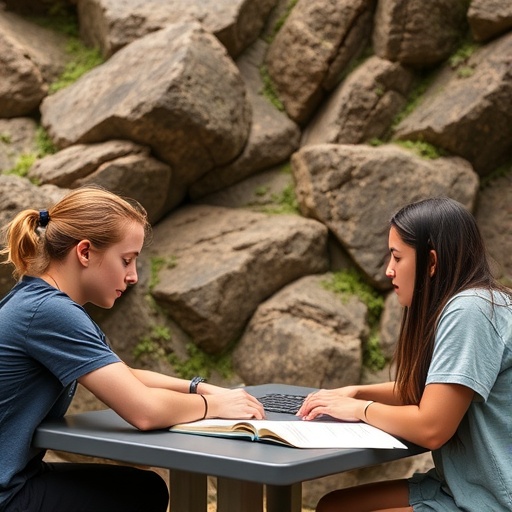In recent years, the focus on inclusivity in higher education has gained significant traction, particularly concerning neurodiverse individuals. A groundbreaking study titled “Autistic voices in higher education: lessons from U.K. geoscience students to inform inclusive practices for neurodiverse learners” sheds light on the experiences of autistic students within the realm of geoscience education. This investigation, led by renowned researchers Jeffery, Rogers, and Jeffery in 2025, emphasizes not just the challenges faced by these students but also highlights effective strategies to foster an inclusive educational environment tailored for their unique needs.
The study begins by establishing the critical context of neurodiversity in higher education. Neurodiversity, a term encompassing a range of neurological variations, including autism, has shown that individuals experience and engage with the world uniquely. It is imperative for educational institutions to recognize this diversity and adapt their teaching methodologies accordingly. This study aims to extract valuable insights from autistic geoscience students to help shape educational practices that support diverse learning styles and requirements.
Diving deeper into the experiences of autistic students, the research outlines common barriers they encounter in geoscience programs. These barriers often stem from traditional educational frameworks that prioritize a one-size-fits-all approach. Autistic students may find typical classroom settings challenging due to sensory overload, communication differences, and rigid behavioral expectations. Understanding these challenges is crucial for the development of equitable educational strategies.
A key finding of the study is the overwhelming need for representation and voice among autistic students. Many participants expressed feelings of marginalization within their academic settings, where their unique perspectives were often overlooked. The research emphasizes the need for institutions to actively solicit feedback from neurodiverse students to create more responsive and effective educational environments. This participative approach not only empowers students but also enriches the educational landscape by integrating diverse viewpoints.
Pedagogical adjustments are another significant focus of the research. The study recommends innovative teaching strategies tailored to the needs of neurodiverse learners. For instance, incorporating flexible assessment methods can enable a broader range of student expressions and understanding. This could include alternative forms of evaluation that consider different processing styles or experiential learning opportunities that enhance engagement and retention. Such changes represent a shift toward more inclusive and effective educational practices.
In addition to pedagogical adaptations, the research underscores the importance of fostering supportive social networks within academic institutions. Many autistic students highlighted the value of mentorship programs and peer support as vital components of their educational experience. Peer interactions not only diminish feelings of isolation but also facilitate collaborative learning, providing diverse perspectives that enhance the depth of understanding in scientific inquiry, particularly in geoscience, where teamwork is often essential.
Another critical aspect identified in the study is the need for training and awareness among educators and administrative staff regarding neurodiversity. Enhancing teacher training programs by integrating modules on neurodiversity will prepare faculty to better understand and support their autistic students. Educational institutions must prioritize professional development that equips teachers with the necessary tools to encourage inclusivity within their classrooms.
Furthermore, the study advocates for policy reforms within education systems to promote inclusivity at a higher level. This involves not only redesigning curricula but also ensuring that institutional policies reflect an understanding of neurodiverse needs. Establishing clear guidelines for inclusiveness can set a tone of acceptance and understanding within the campus culture, paving the way for all students to thrive.
Recognizing the implications of this research extends beyond the classroom walls. It calls for a cultural shift in how society views neurodiversity in higher education and beyond. By valuing autistic voices and emphasizing their contributions, institutions can significantly enhance the learning environment for all students. This cultural change is not solely beneficial for neurodiverse learners but for the entire academic community, fostering a richer and more varied intellectual discourse.
As universities increasingly prioritize diversity and inclusion, the findings of this study serve as a critical reminder of the importance of listening to marginalized voices. The experiences of autistic geoscience students are illuminating pathways toward a more inclusive academic landscape. By implementing the lessons learned from this study, educational institutions have the opportunity to transform not only their practices but also their institutional culture and identity.
The researchers stress that the fight for inclusivity is ongoing and requires sustained commitment from all stakeholders involved in higher education. Institutions must remain proactive in their efforts to create environments where all students, regardless of neurological differences, can succeed. This determination to build an inclusive culture will ultimately position universities as leaders in progressive educational practices.
In conclusion, the research conducted by Jeffery and his colleagues illuminates vital pathways toward inclusivity for neurodiverse learners in higher education. The lessons drawn from U.K. geoscience students provide actionable insights that can significantly enhance educational practices. As the conversation around neurodiversity continues to evolve, it is crucial that educators, administrators, and policymakers heed these insights and strive for an academic environment where every voice is valued and heard, fostering a richer educational experience for all.
Subject of Research: The experiences of autistic students in higher education, specifically in U.K. geoscience courses, and strategies for fostering inclusive practices.
Article Title: Autistic voices in higher education: lessons from U.K. geoscience students to inform inclusive practices for neurodiverse learners.
Article References: Jeffery, A.J., Rogers, S.L., Jeffery, K.L.A. et al. Autistic voices in higher education: lessons from U.K. geoscience students to inform inclusive practices for neurodiverse learners. Discov Educ 4, 326 (2025). https://doi.org/10.1007/s44217-025-00639-8
Image Credits: AI Generated
DOI:
Keywords: neurodiversity, autism, higher education, inclusive practices, geoscience, U.K.




